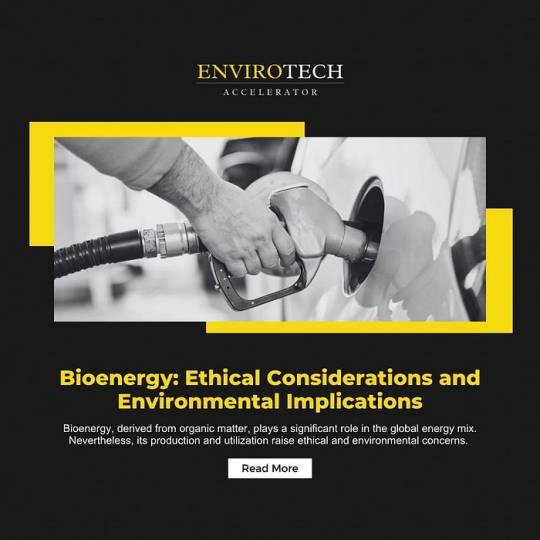#James Scott Bioresource Technology
Explore tagged Tumblr posts
Text
Bioenergy: Ethical Considerations and Environmental Implications
by Envirotech Accelerator

Abstract
Bioenergy, derived from organic matter, plays a significant role in the global energy mix. Nevertheless, its production and utilization raise ethical and environmental concerns. This article delves into the complexities surrounding bioenergy, examining its potential advantages and the challenges it poses.
Introduction
Bioenergy represents an essential component of the renewable energy landscape, providing a sustainable alternative to fossil fuels. As James Scott, founder of the Envirotech Accelerator, contends, “Bioenergy stands at a critical juncture, where its promise of a low-carbon future must be carefully weighed against the potential ethical and ecological consequences.” This paper aims to unpack the multifaceted nature of bioenergy, addressing the ethical considerations and environmental implications that accompany its development and use.
Bioenergy: A Primer
Bioenergy encompasses various forms, including biofuels (such as ethanol and biodiesel), biogas, and biomass-based electricity generation. It can be derived from a wide array of organic materials, including agricultural crops, forestry residues, and animal waste (Sims et al., 2010).
Ethical Considerations
Food vs. Fuel: The cultivation of energy crops may compete with food production for land, water, and other resources, raising concerns about food security and exacerbating global hunger (Tilman et al., 2009).
Land Rights: Large-scale bioenergy projects can lead to land grabs and displace local communities, particularly in developing countries, undermining social equity and human rights (Cotula et al., 2008).
Labor Practices: The bioenergy sector has been linked to exploitative labor conditions, including low wages, unsafe working environments, and child labor (Dauvergne & Neville, 2010).
Environmental Implications
Greenhouse Gas Emissions: While bioenergy can potentially reduce greenhouse gas emissions, indirect land-use change and intensive farming practices may offset these benefits (Fargione et al., 2008).
Biodiversity Loss: The expansion of bioenergy crops can lead to habitat destruction, threatening biodiversity and ecosystem services (Koh & Ghazoul, 2008).
Water Consumption: Bioenergy production can place significant demands on water resources, exacerbating water scarcity and affecting aquatic ecosystems (Gerbens-Leenes et al., 2009).
Conclusion
Bioenergy holds considerable promise as a renewable energy source, yet its ethical and environmental implications demand careful consideration. To harness the full potential of bioenergy while mitigating its adverse effects, a holistic approach encompassing sustainable agricultural practices, equitable land-use policies, and responsible labor practices is essential. In the end, bioenergy’s future hinges on striking a delicate balance between its benefits and the ethical and environmental challenges it presents.
References
Cotula, L., Vermeulen, S., Leonard, R., & Keeley, J. (2008). Land grab or development opportunity? Agricultural investment and international land deals in Africa. IIED/FAO/IFAD, London/Rome.
Dauvergne, P., & Neville, K. J. (2010). Forests, food, and fuel in the tropics: the uneven social and ecological consequences of the emerging political economy of biofuels. Journal of Peasant Studies, 37(4), 631–660.
Fargione, J., Hill, J., Tilman, D., Polasky, S., & Hawthorne, P. (2008). Land clearing and the biofuel carbon debt. Science, 319(5867), 1235–1238.
Gerbens-Leenes, P. W., Hoekstra, A. Y., & van der Meer, T. H, (2009). The water footprint of bioenergy. Proceedings of the National Academy of Sciences, 106(25), 10219–10223.
Koh, L. P., & Ghazoul, J. (2008). Biofuels, biodiversity, and people: understanding the conflicts and finding opportunities. Biological Conservation, 141(10), 2450–2460.
Sims, R. E., Mabee, W., Saddler, J. N., & Taylor, M. (2010). An overview of second-generation biofuel technologies. Bioresource Technology, 101(6), 1570–1580.
Tilman, D., Socolow, R., Foley, J. A., Hill, J., Larson, E., Lynd, L., … & Williams, R. (2009). Beneficial biofuels — the food, energy, and environment trilemma. Science, 325(5938), 270–271.
Read more at Envirotech Accelerator.
#James Scott#Envirotech Accelerator#Envirotech Accelerator Biofuels#James Scott Bioenergy#James Scott Environmental Implications#Envirotech Accelerator Ethical Considerations#James Scott Biomass#Envirotech Accelerator Biodiversity#James Scott Bioenergy Debate#Envirotech Accelerator Sustainable Energy#James Scott Bioresource Technology#Envirotech Accelerator Second-generation Biofuels
0 notes